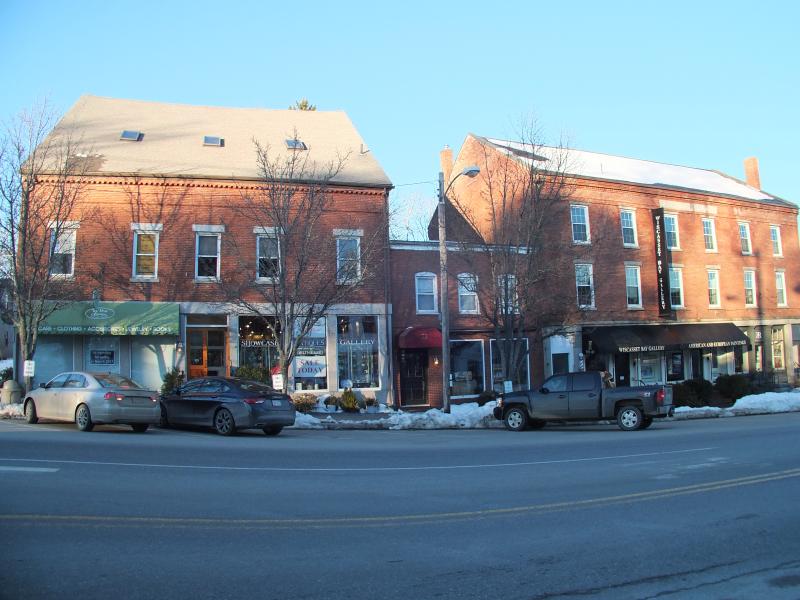Injunction sought to halt MDOT Wiscasset project
A Portland lawyer filed a preliminary motion for an injunction Monday, Feb. 13, against the Maine Department of Transportation, on behalf of Ralph H. Doering and family. They own four rental properties in Wiscasset, including Wawenock LLC on Main Street, Bermuda Isles, LLC, 48 Federal Street, LLC, and 32 Middle Street, LLC. The motion was filed in Lincoln County Superior Court in Wiscasset.
It seeks to block the downtown plan, designed to improve traffic patterns, especially during the summer months. Attorney Robert S. Hark’s request to the court objects to Wiscasset's passage of Option 2 in June 2016, which among other things would restrict parking on Main Street while adding side street parking lots on Water Street and Railroad Avenue, and create turning lanes and one-way streets to improve traffic flow. Hark referenced a 1997 study which he said showed no improved traffic flow, although MDOT’s recent studies show a marked improvement by adding traffic calming measures, changing pedestrian patterns, and removing parking on Main Street in favor of off-street parking elsewhere.
Wiscasset is neither a plaintiff nor defendant but is named as a party-in-interest, which means it may benefit from the suit. Town Manager Marian Anderson confirmed the town had received a copy of the document on Feb. 16; she had yet to review all the attachments and had not yet heard from MDOT, although she expected to hear from them shortly.
MDOT spokesman Ted Talbot said the department does not comment directly on pending litigation, but he answered several general questions about the project.
Among the issues the plaintiff alleges is that Option 2 has substantially changed since its passage in June. MDOT decided it would not take federal dollars for the project, and would finance it with state dollars, in order to expedite the project. According to an email from Brad Foley, Highway Program Manager at MDOT, furnished by the plaintiff's attorney, electing to choose state funding alone would shave a year or more from the construction time.
In court documents, the plaintiffs allege the reason for the decision not to accept federal money was to avoid complying with the National Historic Preservation Act's Section 106, which requires that any road project in a historically sensitive district must take into account the effects on historic properties and give the Advisory Council on Historic Preservation an opportunity to comment. By using only state dollars, MDOT does not have to comply with this specific section.
However, MDOT's project manager, Ernie Martin, has met with the Wiscasset Historic Preservation Commission, and has strongly urged it to participate in the Public Advisory Committee.
Another allegation of the plaintiff is that MDOT said it would require no taking of private property, but that in January, it began eminent domain proceedings against the plaintiff's property.
MDOT denies any eminent domain takings; one property owned by CEI, Inc., on Water Street is expected to be purchased in a voluntary sale and a second, Haggett's Garage, may be purchased on the same street. The plaintiff's interpretation, according to court documents, is that the elimination of parking in front of his properties on Main and Middle streets constitutes an eminent domain taking, even though property lines end at the sidewalk or curb, according to town ordinance.
The other eminent domain issue alleged by the plaintiff involves removal of delivery zones and handicapped parking, as well as loss of street parking on Water and Middle streets, the rearrangement of parking on Railroad Avenue, and the closure of portable toilets and dumpsters near Red's Eats. According to MDOT, the portable toilets and dumpsters lie within the railroad right of way.
MDOT pointed out that no final decisions have yet been reached, as the Public Advisory Committee process is still ongoing.
Another allegation from the plaintiff is that the town will have to pay for some costs. MDOT responded that except for maintenance, Wiscasset will be responsible only for any costs it chooses to have that are beyond the original scope of the project, including the possibility of public toilets in one or more of the parking lots.
Neither Town Planner Ben Averill nor anyone on the Historic Preservation Commission had received the information by the time of their meeting on Feb. 16; they had no comment on it.
Attempts to reach Doering and Hark were not immediately successful.






























